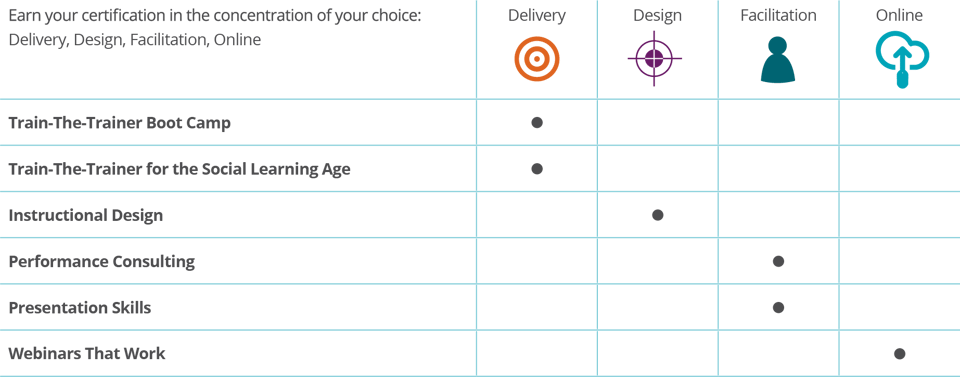Military Only Train-the-Trainer Boot Camp: Overview

2 day classroom $972
Click Here to bring this training on-site
Do you picture a typical training room as full of faces struggling to stay awake & repel the frontal assault of PowerPoint® lectures? |
 |
For more than two decades, The Bob Pike Group (BPG) has been working with the United States Military and dovetailing our workshops to fill their needs and help participants better apply the concepts to military applications. Because of this, we have customized our two-day train-the-trainer boot camp to focus specifically on those who work in or with the military, such as those doing on-base trainings for civilian employees.
With our military version of our Train-the-Trainer Boot Camp, you can transform your training and education. Spend two action-packed days at Bob Pike's Train-the-Trainer Boot Camp learning how to:
- create powerful new openings for your training;
- cut your preparation time by 50 percent;
- use an eight-step process to transform your current courses into high impact learner-centered courses;
- apply the latest adult learning theories to your design and delivery;
- accelerate learning in special situations such as computer training and technical training;
- create powerful new ways to demonstrate the results of your training; and
- see and experience specific military examples and applications for the activities and techniques.
| You can also contact us about sponsoring a boot camp which we can then even further customize for you. For more information on how we have worked with the military, read this article. |
The Bob Pike Group has provided trainer development workshops, talent development, and instructional design services to the US Government for more than 30 years. Our clients include:
The Bob Pike Group has provided trainer development workshops, talent development, and instructional design services to the US Government for more than 30 years. Our clients include:
| USMC Camp Lejeune | USAF Personnel Center | US Navy Norfolk Naval Shipyard |
| US Army Soldier Support Institute | USMC MCAS (Worldwide) | US Army Logistics University |
| USMC Camp Pendleton | USAF Family Advocacy | US Navy Fleet and Family |
| USAF 392 TRS, Vandenburg AFB | Electric Boat | USAF 505th Training Squadron, Hurlburt, AFB |
| US Navy Bechtel Bettis Marine Propulsion |
The National Guard (MN, NH, OH, WY, IL) |
US Navy Pearl Harbor Naval Shipyard |
| USAF AETC Symposium 2012 | US Army Training Development Directorate | USMC T3 School East & West |
We look forward to providing our public seminars, military only workshops, onsite training programs and design services. Thank you for your service!
"The creative training techniques presented by The Bob Pike Group are 'game changers' that every Department of Defense employee should incorporate into all military breifs and classroom instruction." - C.A. Hester, USMC Sexual Assault Program Manager
Past Boot Camp graduates represent:
USMC: T3 School East & West, Camp Lejeune & Camp Pendleton;Civilian Workforce Development, MCAS Cherry Point; MCCS (Worldwide); SNCOA, Camp Pendleton; SNCOA Sergeant's Course, MCAGCC 29 Palms; MCTOG, 29 Palms; Marine Force Reserve; Marine Corps Family Teambuilding;Formal School Managers Symposium, MCB Quantico;SAPR Program;Recruiting Command, MCB Quantico
USAF: AETC Symposium 2012; Air Force Personnel Center, Randolph AFB; Family Advocacy, Lackland AFB; 367 TRSS, Hill AFB; 392 TRS, Vandenberg AFB; Community Readiness, Spangdahlem AFB; 9th FSS, Beale AFB; A&FRC, Andrews AFB; EC/MOS Det 2, Scott AFB; EX/MOS Det 1, Hurlburt AFB; 505th Training Squadron, Hurlburt, AFB
The National Guard: Minnesota, New Hampshire, Ohio, Kentucky, Wyoming, Illinois
US Army: Army Logistics University; Army Soldier Support Institute; Adjutant General Branch, Individual Training Division, Training Development Directorate, Soldier Support Institute
US Navy: Norfolk Naval Shipyard; Puget Sound Naval Shipyard; Pearl Harbor Naval Shipyard; Bechtel Bettis Marine Propulsion; Electric Boat; US Navy Fleet and Family; Navy Center for Personal and Professional Development; MSW/SAPR Program, Navy Installations Command (CNIC)
| "This training has been the perfect combination of fun, learning, and reflection. The whole process has helped me develop a better understanding of the ideal ways a presenter can flourish in his/her profession.." - Sheena Parrish, Community Readiness Consultant, A&FRC |
Who
- Classroom instructors who seek to reduce boring lecture and break up the monotony of PowerPoint®
- Trainers seeking practical, immediately applicable alternative training methods
- Anyone dealing with difficult behaviors and multiple generations in training
Purpose
This is a workshop that:
- Illuminates the importance of effective opening and closing activities for increased effectiveness
- Shares techniques to create and manage an effective training environment
- Models Instructor-Led, Participant-Centered training
- Presents proven strategies to transform current training programs to include participant-centered techniques
Objectives
As a participant in this workshop, you will:
- Recognize how to use C.O.R.E (Closers, Openers, Revisiters and Energizers) for participant-centered success
- Explain effective uses of C.O.R.E.
- Select specific C.O.R.E. to use first
- Experience how learner-centered engagement is superior to lecture-based instruction
- Recognize how to use media in a learner centered fashion
- Articulate how the different IL/PC models work
- Examine the eight steps to the design process
- Identify methods to prevent difficult behavior
- Identify ways to add variety to your training
- Explore teaching across multiple generations
Take Aways
You will leave the workshop with:
- The Creative Training Techniques Handbook, Third Edition, by Bob Pike
- The Train-the-Trainer Boot Camp Workbook
- Certificate of Boot Camp Attendance and Completion
- Training Action Plan
- Personal Learning Insight Profile
- Teaching Across the Generations Grid
Agenda
Course Content Overview:
The following are topics that will be covered in this two-day workshop. This seminar will allow you to experience, analyze, and apply information that you learn through the modules below.
Module One: The Power of CORE
- Recognize how to use Closers, Openers, Revisiters, and Energizers for participant-centered success
- Explain effective uses of C.O.R.E.
- Select specific C.O.R.E. to use first
Effective Opening: The Key to Sucess
- Participate in six openers
- List the six key elements of an opener
- Label the three stages of social learning
- Acquire ten examples of openers
- Select an opener to apply to your own training
Effective Closers: Important for the Future
- Participate in six closers
- List the three key elements of a closer
- Select a quick closer to apply to your own training
Effective Revisiters and Energizers
- Identify five strategies for activity management
- Draw seven tips for memory and learning
- Examine rules for revisiting and energizing audiences
- Select two techniques to revisit and energize content
- List five examples of energizers and revisiters
Module Two: Instructor-Led, Participant-Centered Training
- Experience how learner-centered engagement is superior to lecture-based instruction
- Recognize how to use media (PPT) in a learner centered fashion
- Articulate how the different IL/PC models work
Participant-Centered Learning Models
- Complete a learning preferences profile
- Compare personal learning preferences to other trainers'
- Examine Pike's 5 laws of learning
- Recall the three elements of the CIO model
- Recall the three elements of the EAT model
- Recall the three elements of the CPR model
- Examine the four domains of learning
- Apply CORE and IL/PC models to a planning template
Interactive Classroom Management: tactics to use their energy, not yours
- List behaviors of difficult participants
- Brainstorm five strategies to prevent difficult behavior
- Discuss the motivation and learning trends of four generations
- Identify eleven participant-centered strategies that work for everyone
- Identify four ways to make training personal for participants
- List eleven ways to to motivate adults to apply and transfer learning
- List multiple approaches to propel your presentation with effective PowerPoint®
- Review strategies for asking and answering questions like a pro
- Identify methods to gauge learner comprehension during class
- Select appropriate interactive learning activities from 54 alternatives to lecture
Module Three - Engaging Briefing Basics
Discover ways to present Briefs more effectively
- Choose from ten unique 60-second openers to begin your Brief
- Set up partner discussions and/or small group discussions that create engagement throughout
- Model a method that will have participants remembering all of the key information
- Utilize simple techniques that keep participants energized
- Apply the 60/20/8 and CPR models to conducting a Brief
- Choose from at least 5 ways to close a Brief


